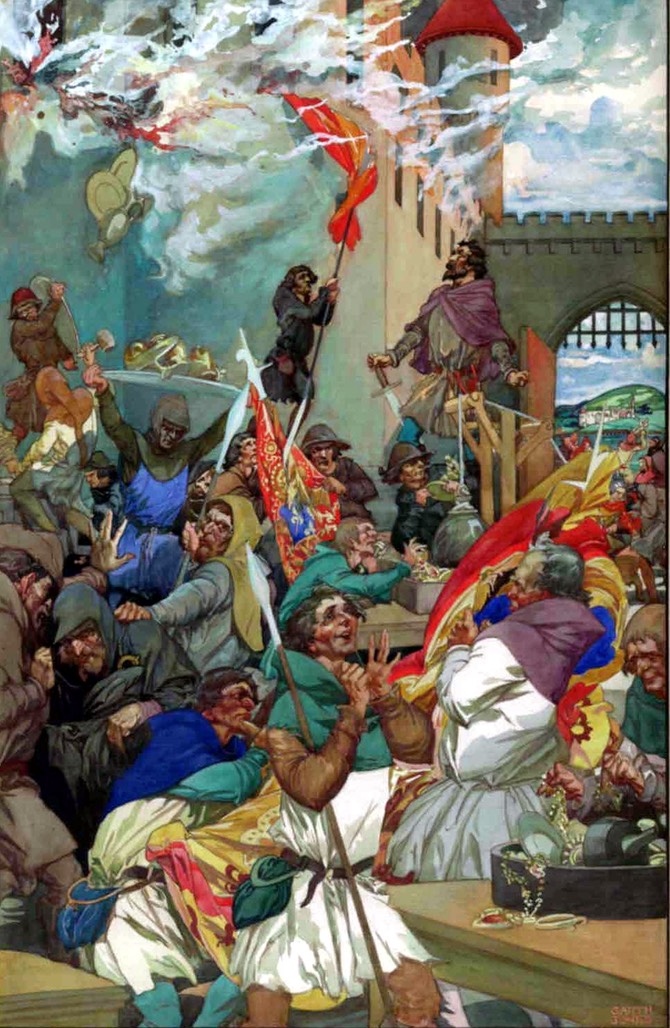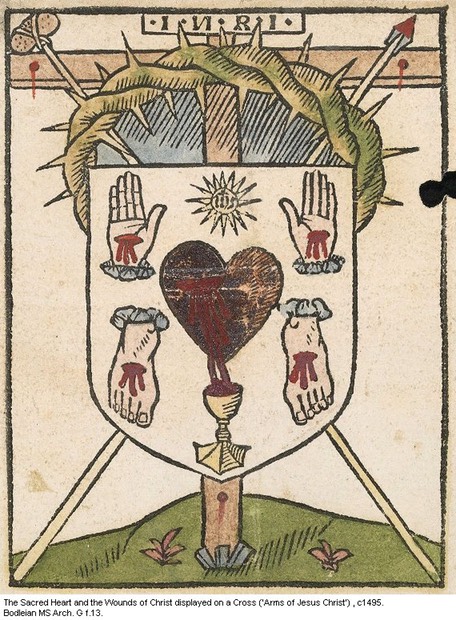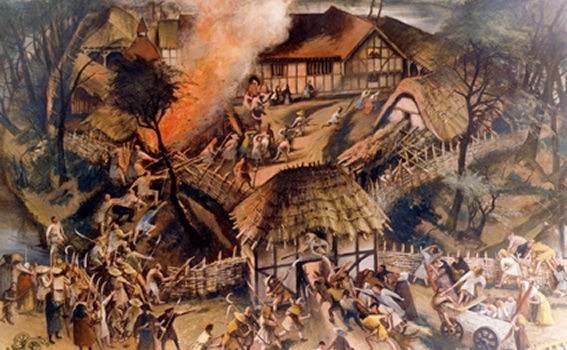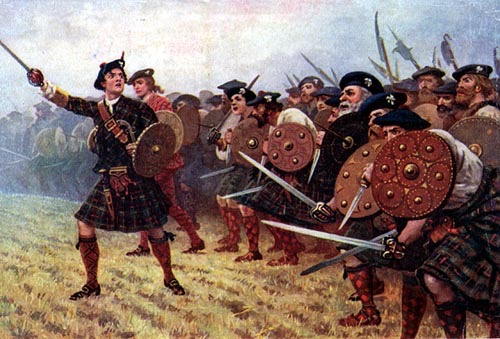Gordon Riots, London, 1780
Writing Mort du Arthur in the 1460s, Thomas Malory confronted his fellow Englishmen with a warning when he wrote about the civil war between King Arthur and Sir Mordred that would ultimately destroy the fellowship of the Round Table and return England to strife and disorder.
Lo! you all Englishmen. See you not what a mischief here was? For he that was the most King and noblest Knight of the world and most most loved the fellowship of noble knights and by him they were all upholden, and yet might not these Englishmen hold them content with him. Lo! thus was the custom and usages of the land, and men say that we of this land have not yet lost that custom. Alas! this is a great default of us Englishmen, for there may us nothing please no term.
Malory was certainly not the only critic of the English penchant for rebellion, civil war, and coups d'état. The Milanese ambassador to Paris wrote in 1471 that the English people and their nation should be plunged into the sea by their lack of stability and order. A long line of French commentators upon the follies of their neighbors across the Channel were both fascinated and horrified by the frequency of revolt, insurrection and instability of the English, and especially noted the uncertainty of English political life and the precarious existence of English monarchs. Perhaps he was exercising a turn of rhetorical hyperbole when, in 1481, the Chancellor of France informed the Estates General that the English had suffered twenty-six dynastic changes since the founding of the English monarchy, but his point was nevertheless well placed.

Even Shakespeare perhaps tacitly noted the problem in his remark in Henry IV--"uneasy rests the head that wears the crown." Indeed, a brief survey of kings who had lost their crown, usually fatally, as a result of civil war or coups since 1300—Edward II, Richard II, Henry VI, Edward V, and Richard III—tends to support Shakespeare’s cautionary statement. A partial list, by no means exhaustive, of the most important rebellions, risings, wars of succession and palace coups from the death of William the Conqueror (and William himself faced several rebellions) to the reign of Henry VII is most impressive:
Wars of Succession 1130s-1154
Henry II : Revolt of the Princes : 1173
King John : Runnymede :1215
King John : First Baron’s War :1217
King Henry III : Second Baron’s War : 1264
Edward II: Rebellion of the Marches : 1312-1326
Edward II : Invasion by Isabella and Mortimer and murder to Edward.
Richard II: Wat Tyler's Rebellion : 1381
Richard II: Baron's Revolt : 1387
Henry IV : Percy's Rebellions : 1403-1408
Henry VI : Cade's Rebellion : 1450
Henry Tudor’s Rebellion : 1485
Henry VII : Stafford and Lovell Rebellion (1486)
Henry VII : Rebellions of Lambert Simnel and Perkin Warbeck : 1487-1497
Henry VII : Cornish Rebellion : 1497
Contemporary commentators on English history and politics (and modern scholars as well), had little doubt that civil war, rebellion and popular disturbances were important defining features of English politics and, indeed, of English life. They certainly did not disappear at the end of the Middle Ages, but continued to be something of a constant throughout the Tudor and Stuart dynasties and even into the Georgian Age.
In his book on Late Medieval England, Chris Given-Wilson identifies “four principal types of disturbances” that can be used to categorize rebellions of the later Middle Ages in England.

- Reformist rebellions intended to correct some perceived abuses in the king’s government and remove from the king’s presence those responsible for the abuses. Such rebellions generated some set of formal demands or list of grievances, and, if successful, compelled the king to honor them.
- Dynastic risings that were intended to remove one ruler and seat another on the throne. Sometimes the dynastic rising was preceded by formal complaints against the ruling monarch, and, of course, sometimes these formal complaints were mere trappings, window dressing if you will, supplied by the parties who wished to remove the sitting monarch and replace him (or her) with their own candidate.
- Popular risings, often local, occasionally national, were generally brought about by changing economic conditions and patterns that either threatened the economic stability of the peasantry or threatened the social status of some element of the common population—tenant farmers, day laborers, apprentices or others who lived just on the edge, usually the reasonably comfortable edge, of subsistence.
- The last, and perhaps most important as we begin our study, is religious uprisings.

The Peasants' Revolt 1381
While rebellion was frequent during the course of Medieval English history, revolution and reform are not words much used. One of the objects of this class will be to discuss the interrelationship between rebellion, revolution and reform, all words that can mean much the same thing (yes, even reform) depending on the specific object in each case, and, as well, on whose ox is being gored and how successful the goring. At what point, for instance, and to whom, does a rebellion become a revolution? To what extent does reform damage the old way of doing things and traditional beliefs, especially religious beliefs, and who is damaged by the new post reform state of affairs? We will see that major changes in the English body politic and religion caused by reforms cause ripples that breed reaction, often violent, among those who perceive an adverse effect. Additionally, we will see that once change is brought about, it is often difficult to impede further, often more radical, change. This case is especially true during periods of religious innovation, and, as we will see, religion, and fear of some kind of religious innovation appears regularly in all of the reforms, rebellions and revolutions that we will examine.
Our class will study the reformations, rebellions and revolutions of the period that historians, who are very fond of labeling historical periods, call the Early Modern Period of English history. While we might have begun with the civil war that put Henry Tudor on the throne, I decided, not entirely arbitrarily, to begin with Henry VIII and his reformation of the English Church. There were two reasons for my decision. First, I had to consider the time available. I also believe that the various disorders that plagued Henry VII were more like those of the Late Middle Ages, and I believe that there are discernible differences between those and the ones that begin with the reforms of his son, Henry VII.

Prestonpans 1745
Course Objectives
So far, I have largely described what we will not be examining, so let’s take a look at the events that we will explore:
- The Tudor Reformations: Over the course of some three classes, we will examine the contributions and innovations that Henry VIII, Edward VI, Mary and Elizabeth I made to the religion (and constitution) of England, and we will also take a look at the disruptions, confusion and angst and violence that followed upon each stage of the English Reformation.
- The English Civil War: We will spend three classes exploring the causes of the war and examining the notion that civil disturbances of this magnitude tend not to have simple, or even single causes, but are rooted in complex social, religious, economic and constitutional factors. We will also explore some of the various consequences of the war and its aftermath.
- We will examine the Glorious Revolution, not only as a significant English national event, but as an “Atlantic event” that spread from England to His Majesty’s colonies in North America, effecting relations with the mother country, not only among those colonies which experienced Glorious Revolutions of their own (we will take a close look at Massachusetts, New York and Maryland), but even in those that did not.
- We will look briefly at unrest and rebellion that punctuated the accession of the Hanover Dynasty.
- Finally, we will employ the last three class meetings to examine the causes and course of the American Revolution as an Atlantic phenomena, an English civil war. We will look at the American Revolution from American and British perspectives, examining both the background of colonial perceptions, understandings and expectations concerning their relationship with the mother country and the British imperial, political and constitutional issues that complicated colonial relationships.
Throughout the course we will also examine the historiographical wrangling over the events in question and discuss the various interpretive positions that historians have taken in their quest to understand the past within the framework of the historical discourse.